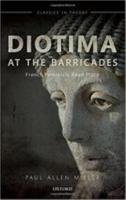
Within the arresting title of this volume lurks a symbol of the two-fold experience that this reviewer had with it, as the ‘read’ in the title can be construed in either the present or past tense. In the vivid present, it describes the meticulous way in which Miller takes his audience through the intricacies of the engagement that the ‘French Feminists’ (here, amongst others, Luce Irigaray, Julia Kristeva, Hélène Cixous and Sarah Kofman) stage with the Platonic philosophical legacy. In the simple past, though, it seemingly represents the major and very simple argument of this book: that these philosophers did in fact engage with Plato’s writings, and that this is something worth reflecting on.
The introduction starts at a break-neck theoretical speed, with three enigmatic epigraphs (one drawn from Plato’s Symposium) and the following sentence: ‘In these three quotations can be sketched a trajectory stretching from the Other, as a moment of opposition, to the “elsewhere,” as a moment of transcendence’ (1). This will not be to everyone’s taste, and especially not to all classicists: Miller does little to sugar the sometimes bitter draft of twentieth-century continental philosophy throughout the book, and one complaint would be that he seems singularly uninterested in arguing for why time should be devoted to untangling these authors’ often abstruse responses to Plato (and I say this as someone who thinks that such an exercise is of the utmost importance).
The four main chapters continue at a similar intellectual velocity, as they expansively explore the resonance of certain Platonic topoi in various constellations of the philosophers under discussion. The first examines the symbol of the cave in Republic in the writings of Irigaray, while the second focuses on the role of the controversial chora from Timaeus in Kristeva’s intellectual project. The third chapter examines the eros of Phaedrus and Symposium in Kristeva and Lacan, and the final chapter focuses on Sarah Kofman and her Nietzschean-inflected writings on ancient philosophy. The section on Kofman’s reading of the Symposium (255-66), along with the short Epilogue, offer the clearest and most methodologically explicit parts of the book, and I would recommend that readers start here.
While the second part of the title gave a clear sense of the nature of this book, the promise of barricades in the first part proves more disappointing. We learn little of the politically engagé nature of these authors’ readings of Plato with only the odd section that ventures outside of the byzantine architecture of their writings, often informed by very arcane psychoanalytic disputes, into the fresh air of the world (see e.g. 152 on May ‘68, and 213-23 on Kofman’s early life).
Another disappointment is that just as Diotima functions as an ambiguous symbol in Symposium through which Plato has Socrates examine the nature of love, so too at times do the French Feminists seem to function as a proxy through which Miller puts forward his own readings of Plato (see e.g. 80-103 on the cave). In conclusion, though this book is unlikely to convince the profanum vulgus of the value of reading Plato alongside the authors under discussion, for the initiates it is a thorough and often challenging map to the particularly complex Platonic legacy of twentieth-century feminist philosophy.
Adam Lecznar (Leeds/UCL)
